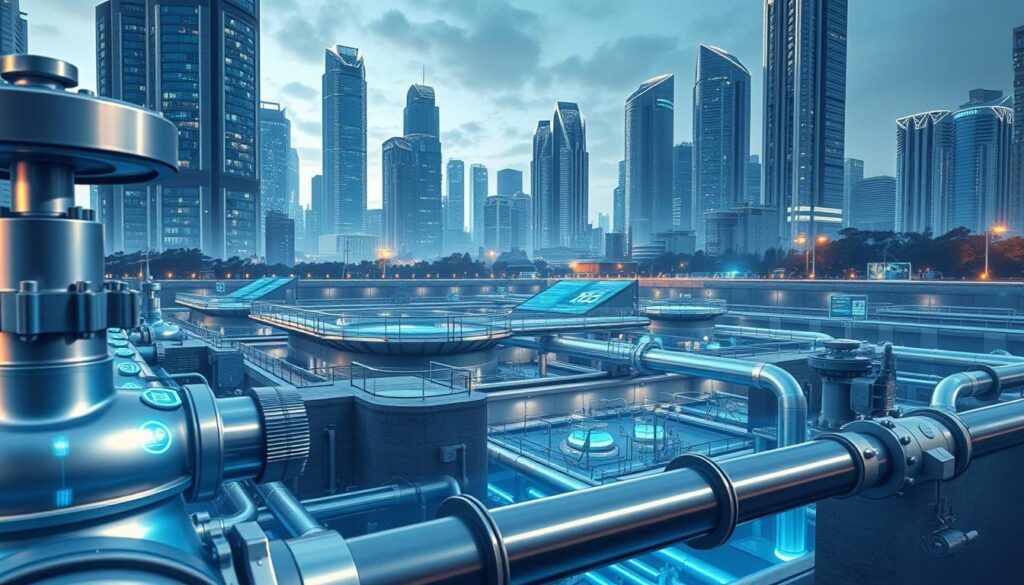As urban populations continue to grow, cities face increasing challenges in managing resources efficiently. One critical question arises: Can effective water management be the key to unlocking the full potential of smart cities?
Efficient water engineering is at the heart of this inquiry, involving the integration of sustainable practices, innovative technologies, and effective management strategies to ensure resilient urban water systems.
The concept of smart cities has gained significant attention, with a focus on leveraging technology to improve urban living. Mastering water management is crucial in this context, as it directly impacts the quality of life for urban residents.
Key Takeaways
- Efficient water management is crucial for smart cities.
- Sustainable practices and innovative technologies are key to resilient water systems.
- Effective water engineering enhances the quality of urban living.
- Mastering water management is essential for urban planning.
- Smart cities rely on integrated water management strategies.
Understanding the Concept of Smart Cities
Smart cities represent a forward-thinking approach to urban development, leveraging advanced technologies to create more sustainable and efficient environments. At its core, the concept of smart cities involves the integration of technology into the fabric of urban planning and management to enhance the quality of life for citizens.
Definition of Smart Cities
A smart city is characterized by its use of information and communication technologies (ICT) to manage resources, infrastructure, and services effectively. This includes the application of data analytics, IoT sensors, and other digital tools to monitor and manage various aspects of city operations, from traffic management to public safety and sustainable water management.
Key Features of Smart Cities
Some of the key features that define smart cities include:
- Advanced infrastructure that incorporates smart technologies
- Efficient management of resources, including water and energy
- Enhanced public services, such as transportation and waste management
- Increased citizen engagement through digital platforms
- Data-driven decision-making processes
For a city to be considered “smart,” it must effectively utilize these features to create a more livable, sustainable, and resilient environment. This involves not just the adoption of technology, but also a strategic approach to urban planning and management. For more insights on managing civil engineering projects, which are crucial for developing smart city infrastructure, visit this resource.
Role of Technology in Smart Cities
Technology plays a pivotal role in the development and operation of smart cities. It enables the efficient management of urban water infrastructure through real-time monitoring and data analytics. IoT sensors can detect leaks, monitor water quality, and optimize distribution, reducing waste and improving service delivery.
The integration of technology in smart cities also facilitates the development of innovative solutions to urban challenges, such as flood management and wastewater treatment. By leveraging data and analytics, cities can make informed decisions that enhance the sustainability and resilience of their infrastructure.
Importance of Water Engineering in Smart Cities

In the context of smart cities, water engineering is essential for implementing smart water systems that are both efficient and sustainable. Effective water engineering directly impacts the health, safety, and quality of life for urban residents.
Water Supply and Distribution
A reliable water supply is critical for the functioning of any city. Advanced water engineering techniques ensure that water is distributed efficiently, minimizing losses due to leaks or other infrastructure issues. This involves the use of sensors and real-time monitoring systems to detect anomalies and optimize distribution networks.
Wastewater Management
Wastewater management is another crucial aspect of water engineering in smart cities. By implementing advanced treatment technologies, cities can reduce the environmental impact of wastewater and ensure that water resources are protected. This includes the use of innovative treatment processes and the reuse of treated wastewater for non-potable purposes.
Flood Management Solutions
Flood management is a significant challenge in many urban areas. Smart water systems can help mitigate this risk by implementing flood management solutions such as advanced drainage systems and flood forecasting models. These solutions enable cities to respond more effectively to flood events, reducing the risk of damage to infrastructure and property.
| Aspect | Traditional Approach | Smart Water Systems Approach |
|---|---|---|
| Water Supply | Manual monitoring, high water loss | Real-time monitoring, reduced water loss |
| Wastewater Management | Limited treatment capacity, environmental impact | Advanced treatment technologies, water reuse |
| Flood Management | Reactive measures, significant damage | Proactive measures, reduced damage |
The integration of smart water systems in urban planning represents a significant step forward in water engineering. By leveraging technology and innovative practices, cities can improve the efficiency, sustainability, and resilience of their water infrastructure.
Current Trends in Water Engineering
Current trends in water engineering are transforming urban water management systems. The integration of technology and innovative practices is enhancing the efficiency and sustainability of water infrastructure.
Smart Water Management Systems
Smart water management systems are being adopted to optimize water distribution and reduce waste. These systems utilize advanced sensors and real-time data analytics to detect leaks and predict demand.
By implementing smart water management systems, cities can significantly reduce water loss and improve the overall resilience of their water infrastructure. For more information on smart water management, visit Almar Water’s resource on water management in smart.
IoT Applications in Water Engineering
The Internet of Things (IoT) is revolutionizing water engineering by enabling real-time monitoring and control of water systems. IoT devices can measure water quality, detect anomalies, and automate responses to optimize system performance.
The use of IoT in water engineering not only enhances operational efficiency but also supports proactive maintenance and reduces the risk of system failures.
Data Analytics for Efficiency
Data analytics plays a crucial role in optimizing water infrastructure performance. By analyzing data from various sources, water engineers can identify trends, predict future demands, and make informed decisions.
The application of data analytics in water engineering enables cities to adopt a more proactive and sustainable approach to water management, ultimately leading to cost savings and improved service delivery.
These trends highlight the importance of embracing technological advancements and innovative practices in water engineering to create more sustainable and efficient urban water systems.
Challenges in Water Engineering for Smart Cities

Water engineering in smart cities is confronted with a multitude of challenges, from aging infrastructure to regulatory compliance. Despite advancements in innovative water technologies, cities continue to face significant hurdles in managing their water resources effectively.
Aging Infrastructure
One of the primary challenges is the aging water infrastructure that requires upgrading. Many cities have water systems that are decades old, leading to inefficiencies and increased maintenance costs. Upgrading to modern, smart water management systems is crucial for reducing waste and improving service delivery.
For instance, implementing smart water management can help in detecting leaks and predicting maintenance needs, thereby reducing the strain on aging infrastructure.
Climate Change Impacts
Climate change poses another significant challenge, as it alters precipitation patterns and increases the frequency of extreme weather events. This necessitates adaptive management strategies that can respond to changing conditions. Cities must invest in resilient water infrastructure that can withstand the impacts of climate change.
- Implementing green infrastructure to manage stormwater runoff
- Enhancing water storage capacities to handle variability in precipitation
- Developing early warning systems for flood management
Regulatory and Compliance Issues
Regulatory compliance is also a major challenge, as water engineering projects must adhere to strict water quality standards. Ensuring compliance requires robust monitoring and reporting systems, as well as collaboration with regulatory bodies.
By adopting innovative water technologies and practices, cities can not only meet regulatory requirements but also improve the overall efficiency of their water management systems.
Innovative Solutions for Water Infrastructure
Innovative approaches are being adopted globally to enhance the resilience of urban water systems. Cities are increasingly facing challenges related to water supply, wastewater management, and flood control, necessitating the adoption of cutting-edge solutions.
Sustainable Water Practices
Sustainable water practices are crucial for reducing the strain on urban water resources. These practices include water conservation, efficient irrigation systems, and the reuse of water for non-potable purposes. By adopting these practices, cities can significantly reduce their water consumption and enhance their water resilience.
For instance, a study by the Stantec highlights the importance of integrating innovative water solutions into urban planning to address the challenges posed by aging infrastructure and climate change.
Green Infrastructure Techniques
Green infrastructure techniques, such as the use of permeable pavements, green roofs, and urban wetlands, play a vital role in managing stormwater runoff and reducing the burden on urban drainage systems. These techniques not only help in mitigating flood risks but also contribute to improving water quality.
Smart Metering Solutions
Smart metering solutions are being increasingly adopted to monitor and manage water consumption in real-time. These solutions enable utilities to detect leaks, predict water demand, and optimize their distribution networks. By leveraging data analytics and IoT technologies, cities can significantly improve the efficiency of their water supply systems.
| Innovative Solution | Description | Benefits |
|---|---|---|
| Sustainable Water Practices | Water conservation, efficient irrigation, water reuse | Reduced water consumption, enhanced water resilience |
| Green Infrastructure Techniques | Permeable pavements, green roofs, urban wetlands | Stormwater management, flood risk mitigation, improved water quality |
| Smart Metering Solutions | Real-time monitoring, leak detection, demand prediction | Improved efficiency, optimized distribution networks |
By embracing these innovative solutions, cities can enhance their water resilience, reduce the risks associated with water scarcity and flooding, and create a more sustainable future for their residents.
The Role of GIS in Water Engineering

The integration of GIS in water engineering has revolutionized the way we map, analyze, and manage water resources. By combining GIS with IoT water management, water engineers can now monitor and manage water distribution systems more effectively.
Mapping Water Resources
GIS technology is used to create detailed maps of water resources, including rivers, lakes, and reservoirs. This information is crucial for understanding the availability and distribution of water resources. Accurate mapping enables water engineers to identify areas of high water stress and develop strategies to mitigate these issues.
The use of GIS in mapping water resources also facilitates the integration of real-time data from IoT devices, providing a comprehensive view of the current state of water resources.
Infrastructure Planning and Management
GIS plays a significant role in planning and managing water infrastructure, such as pipelines, treatment plants, and pumping stations. By analyzing spatial data, water engineers can optimize the design and operation of these systems.
| Infrastructure Component | GIS Application | Benefit |
|---|---|---|
| Pipelines | Route optimization | Reduced construction costs |
| Treatment Plants | Site selection | Improved efficiency |
| Pumping Stations | Capacity planning | Enhanced reliability |
Data Visualization Techniques
GIS enables the visualization of complex data through maps, charts, and graphs, facilitating better decision-making. By using data visualization techniques, water engineers can communicate complex information to stakeholders more effectively.
The combination of GIS and IoT water management allows for real-time monitoring and visualization of water distribution systems, enabling swift response to anomalies and issues.
Integrated Water Resource Management (IWRM)
Achieving sustainable urban water conservation requires the implementation of Integrated Water Resource Management (IWRM) principles. IWRM is a holistic approach that considers the social, economic, and environmental aspects of water management.
IWRM involves the coordination of various stakeholders, including government agencies, private sector entities, and community groups, to ensure that water resources are managed in a way that balances human needs with environmental sustainability.
Advantages of Implementing IWRM
The benefits of IWRM are multifaceted, contributing to more efficient and sustainable water management practices. Some of the key advantages include:
- Improved water supply and quality
- Enhanced flood management and mitigation
- Better allocation of water resources
- Increased stakeholder engagement and participation
By adopting IWRM, cities can ensure that their water resources are managed in a sustainable and equitable manner, supporting both economic development and environmental protection.
Stakeholder Engagement in IWRM
Effective stakeholder engagement is critical to the success of IWRM initiatives. This involves:
- Identifying key stakeholders and their roles
- Fostering collaboration and communication among stakeholders
- Ensuring that stakeholder concerns are addressed in the decision-making process
By engaging stakeholders, cities can build trust and ensure that IWRM plans are responsive to the needs of the community.
Best Practices for IWRM Implementation
Successful IWRM implementation requires the adoption of best practices, including:
| Best Practice | Description | Benefits |
|---|---|---|
| Integrated Planning | Coordinated planning across sectors and stakeholders | Improved water management outcomes |
| Data-Driven Decision Making | Use of data analytics to inform water management decisions | Enhanced efficiency and effectiveness |
| Community Engagement | Involvement of local communities in water management decisions | Increased public awareness and support |
By adopting these best practices, cities can ensure that their IWRM initiatives are effective and sustainable, contributing to urban water conservation and environmental sustainability.
Case Studies of Smart Water Solutions

As cities continue to grow, the adoption of smart water solutions has become crucial, with numerous case studies demonstrating their effectiveness. These case studies provide valuable insights into how different cities have addressed their water management challenges.
Successful Projects in the United States
The United States has seen a variety of successful smart water projects. For instance, cities like Los Angeles and New York have implemented advanced water metering systems to improve water efficiency. These projects have not only reduced water consumption but also helped in detecting leaks and predicting future demand.
A notable example is the Smart Water Cities report, which highlights various case studies across the U.S., showcasing innovative approaches to water management.
International Examples of Best Practices
Internationally, cities have also made significant strides in smart water management. Singapore, for example, has implemented a comprehensive water management system that includes advanced technologies like IoT sensors and data analytics to optimize water distribution and consumption.
Another example is Melbourne, Australia, which has adopted a sustainable water management plan that includes water recycling and efficient irrigation systems. These international examples provide valuable lessons for other cities looking to improve their water management practices.
| City | Smart Water Solution | Outcome |
|---|---|---|
| Los Angeles, USA | Advanced Water Metering | Reduced water consumption by 15% |
| Singapore | Comprehensive Water Management System | Improved water efficiency by 20% |
| Melbourne, Australia | Sustainable Water Management Plan | Increased water recycling by 30% |
Lessons Learned from Case Studies
Examining these case studies reveals several key lessons. Firstly, the importance of adopting a holistic approach to water management, incorporating technologies like IoT and data analytics. Secondly, the need for stakeholder engagement, including government agencies, private sector entities, and the community, as highlighted in the Engineering the Future report.
These case studies demonstrate that sustainable water management is achievable through the right combination of technology, policy, and community involvement.
Stakeholder Collaboration in Water Projects
Collaboration among diverse stakeholders is a key factor in achieving sustainable urban water infrastructure. The success of water projects in smart cities relies heavily on the cooperation and collective efforts of various stakeholders, including government agencies, private sector entities, community groups, and academic institutions.
Government and Private Sector Partnerships
Partnerships between government agencies and private sector entities are crucial for leveraging resources, expertise, and technology to improve smart water systems. For instance, public-private partnerships (PPPs) can facilitate the development of innovative water management solutions. According to a report, PPPs have been successful in various water projects worldwide, enhancing efficiency and sustainability.
| Partnership Model | Description | Benefits |
|---|---|---|
| Public-Private Partnerships (PPPs) | Collaboration between government and private sector for infrastructure development | Innovative solutions, cost efficiency, enhanced service quality |
| Private Sector Investment | Private companies invest in water infrastructure projects | Increased funding, advanced technology, improved management |
Community Involvement
Community involvement is vital for the success of water projects, as it ensures that the solutions implemented are acceptable and beneficial to the local population. Community engagement can be fostered through public awareness campaigns, participatory planning processes, and collaborative decision-making. For example, involving local communities in the planning phase can help identify specific needs and preferences, leading to more effective and sustainable solutions.
Academic Contributions
Academic institutions play a significant role in advancing urban water infrastructure through research and development. By collaborating with government and private sector entities, academic institutions can provide innovative solutions and cutting-edge technologies. For instance, research on civil engineering in project management has led to improved project outcomes and more efficient water management practices.
In conclusion, stakeholder collaboration is essential for the success of water projects in smart cities. By fostering partnerships among government, private sector, community, and academia, cities can leverage diverse expertise and resources to improve smart water systems and achieve sustainable urban water infrastructure.
Funding and Investment in Water Engineering

Funding is a crucial aspect of water engineering projects, enabling cities to implement innovative water technologies and sustainable practices.
Securing adequate funding is essential for the success of water engineering initiatives, which often require significant investment in infrastructure and technology.
Public Funding Sources
Public funding sources play a vital role in supporting water engineering projects. Government grants and subsidies can help cities develop green infrastructure solutions, such as green roofs and rain gardens, which mitigate the impact of urbanization on water resources.
- Federal grants for water infrastructure development
- State-level funding programs for water conservation
- Local government initiatives for sustainable water management
Private Sector Investment Opportunities
The private sector can also contribute significantly to water engineering projects through investments in innovative water technologies, such as smart metering systems and water recycling facilities.
Public-Private Partnerships (PPPs) can be an effective way to leverage private sector expertise and funding for water engineering initiatives.
- Identifying potential private sector partners
- Developing PPP models for water infrastructure projects
- Negotiating contracts that balance risk and reward
Grants and Incentives
Grants and incentives can provide additional funding for water engineering projects, encouraging the adoption of green infrastructure solutions and innovative water technologies.
Cities can explore various grant programs and incentives offered by government agencies, non-profit organizations, and private companies to support their water engineering initiatives.
| Grant/Incentive Type | Description | Potential Benefits |
|---|---|---|
| Government Grants | Funding for water infrastructure projects | Supports development of green infrastructure |
| Private Sector Incentives | Tax credits for water conservation projects | Encourages adoption of innovative water technologies |
Future Trends in Water Engineering for Smart Cities
As smart cities continue to evolve, the future of water engineering will be shaped by innovative technologies and sustainable practices. The integration of advanced technologies, such as IoT water management systems, will play a crucial role in enhancing water efficiency and resilience in urban environments.
Emerging Technologies
The adoption of emerging technologies will be a key driver in the future of water engineering. IoT devices will enable real-time monitoring and management of water resources, allowing for more efficient distribution and detection of leaks. Additionally, advanced data analytics will help optimize water treatment processes and predict potential issues before they arise.
For more insights on the challenges and future trends in water management, visit this resource.
Long-Term Sustainability Goals
Long-term sustainability goals will be critical in shaping the future of water engineering in smart cities. Achieving water resilience in cities will require a multifaceted approach, including the adoption of sustainable water practices, reduction of water waste, and promotion of water conservation measures.
- Implementing green infrastructure techniques to manage stormwater runoff
- Promoting water-efficient appliances and fixtures
- Developing smart water grids to optimize distribution
Future Workforce Needs
The future of water engineering will also depend on the availability of a skilled workforce. As cities adopt new technologies and sustainable practices, there will be a growing need for professionals with expertise in areas such as IoT, data analytics, and sustainable engineering. According to insights on the future demand for engineers, certain specialties will be in high as cities evolve.
The future workforce will need to be equipped with the skills to design, implement, and manage advanced water management systems. This will require a strong foundation in STEM education, as well as training in the latest technologies and sustainable practices.
Regulatory Frameworks and Policies

Regulatory frameworks play a crucial role in shaping sustainable water management practices in smart cities. These frameworks are essential for ensuring that water engineering practices are aligned with the goals of urban water conservation and sustainable development.
Key Policies Impacting Water Engineering
Several key policies impact water engineering in smart cities. These include regulations related to water quality, wastewater management, and flood control. For instance, the Clean Water Act in the United States sets standards for water quality and regulates discharges into water bodies.
Key Policies and Their Impacts:
| Policy | Description | Impact on Water Engineering |
|---|---|---|
| Clean Water Act | Regulates discharges into water bodies and sets water quality standards. | Ensures that water engineering practices meet stringent quality standards. |
| Safe Drinking Water Act | Sets standards for drinking water quality. | Impacts the design and operation of water supply systems. |
| Flood Control Acts | Authorizes the construction of flood control measures. | Influences the development of flood management infrastructure. |
Role of Local Governments
Local governments play a vital role in implementing and enforcing regulatory policies related to water engineering. They are responsible for ensuring that local water management practices comply with federal and state regulations.
“Local governments are on the front lines of water management, making them crucial partners in achieving sustainable water conservation goals.”
Local governments can also implement their own policies and initiatives to support urban water conservation. For example, they can promote water-saving practices among residents and businesses.
Compliance with Federal Regulations
Compliance with federal regulations is mandatory for water engineering projects. This includes adhering to standards set by agencies such as the Environmental Protection Agency (EPA).
Ensuring compliance involves regular monitoring and reporting. Water utilities and engineering firms must work closely with regulatory bodies to ensure that their practices meet federal requirements.
By understanding and complying with regulatory frameworks and policies, smart cities can achieve their goals of sustainable water management and urban water conservation.
Educational Resources and Training
Smart water systems and green infrastructure solutions require a workforce equipped with the latest knowledge and skills. To support the development of these systems, educational resources and training programs are vital.
Degree Programs in Water Engineering
Universities across the United States offer degree programs in water engineering or related fields, providing a foundation for careers in this sector. These programs cover a range of topics, from hydrology and hydraulics to water resources management.
Some notable institutions offering such programs include:
- The University of California, Davis
- Stanford University
- The University of Michigan
Certification Programs
For professionals looking to enhance their skills or stay updated with the latest technologies, certification programs are available. These programs often focus on specific areas such as water management, wastewater treatment, or green infrastructure.
A few examples of certification programs include:
- The Certified Water Technologist (CWT) program
- The Leadership in Energy and Environmental Design (LEED) certification
Online Learning Opportunities
Online courses and webinars provide flexible learning options for those who cannot attend traditional classroom settings. These resources cover a wide range of topics relevant to water engineering and smart water systems.
Some popular online learning platforms include:
- Coursera
- edX
- Udemy
To illustrate the variety of educational resources available, consider the following table:
| Resource Type | Description | Examples |
|---|---|---|
| Degree Programs | Comprehensive education in water engineering | University of California, Davis; Stanford University |
| Certification Programs | Specialized training in specific areas | CWT program; LEED certification |
| Online Courses | Flexible learning options on various topics | Coursera; edX; Udemy |
By leveraging these educational resources and training programs, professionals in the field of water engineering can acquire the knowledge and skills necessary to develop and implement smart water systems and green infrastructure solutions effectively.
Conclusion: The Future of Water Engineering in Smart Cities
Mastering water engineering for smart cities requires a multifaceted approach that incorporates innovative water technologies and sustainable water management practices. Effective urban water conservation strategies are crucial for ensuring a resilient and sustainable water future for urban populations.
Key Takeaways
The integration of smart water management systems, IoT applications, and data analytics has transformed the field of water engineering. These advancements enable cities to optimize water distribution, reduce waste, and improve overall efficiency.
Vision for Sustainability
The future of water engineering in smart cities depends on collaborative approaches and the adoption of emerging technologies. By working together, stakeholders can implement sustainable solutions that address the complex challenges facing urban water systems.
Call to Action
Stakeholders must continue to invest in innovative water technologies and sustainable practices to ensure a resilient water future. By doing so, cities can mitigate the impacts of climate change, support population growth, and maintain a high quality of life for residents.
